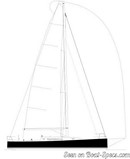J/121
Sailboat specifications
The J/121 is a 40’ (12.2m) cruiser-racer sailboat designed by Alan Johnstone (United States). She was built since 2017 (and now discontinued) by J/Boats (United States). She has been awarded "2018 - Sailing World - Boat of the Year: Best Crossover" and "2018 - SAIL magazine - Best Performance Boat 30 to 40ft".
J/121's main features
- Model
- J/121
- Hull type
- Monohull
- Category
- Offshore cruiser-racer sailboat
- Sailboat builder
- Sailboat designer
- Country
- United States
- Construction
- GRP (glass reinforced polyester):
- Hull: Sandwich Core-Cell fiberglass polyester (vacuum infusion)
- Deck: Sandwich Core-Cell fiberglass polyester (vacuum infusion) - First built hull
- 2017
- Last built hull
- Discontinued
- Award(s)
- 2018: Sailing World - Boat of the Year: Best Crossover
- 2018: SAIL magazine - Best Performance Boat 30 to 40ft
- Appendages
- Keel : L-shaped keel (with bulb)
- Helm
- Twin helm wheels
- Rudder
- Single spade rudder
- Unsinkable
- No
- Trailerable
- No
- EC design categoryiThe CE design category indicates the ability to cope with certain weather conditions (the sailboat is designed for these conditions)
A: Wind < force 9, Waves < 10m
B: Wind < force 8, Waves < 8m
C: Wind < force 6, Waves < 4m
D: Wind < force 4, Waves < 0,5m - A
- Standard public price ex. VAT (indicative only)
- N/A €
J/121's main dimensions
- Hull length
- 40’12.2 m
- Waterline length
- 35’ 10”10.9 m
- Beam (width)
- 12’ 4”3.75 m
- Draft
- 7’ 1”2.15 m
- Light displacement (MLC)
- 11464 lb5200 kg
- Ballast type
- Cast iron fin with lead bulb
- Water ballast
- Lateral water ballasts
- Water ballast capacity
- 2100.4 gal380 liters
J/121's rig and sails
- Upwind sail area
- 969 ft²90 m²
- Downwind sail area
- 2153 ft²200 m²
- Rigging type
- Sloop Marconi 7/8
- Mast configuration
- Keel stepped mast
- Rotating spars
- No
- Number of levels of spreaders
- 2
- Spreaders angle
- Swept-back
- Spars construction
- Carbon fiber spars
- Standing rigging
- Single-strand (ROD) discontinuous
J/121's performances
- Upwind sail area to displacementiThe ratio sail area to displacement is obtained by dividing the sail area by the boat's displaced volume to the power two-thirds.
The ratio sail area to displacement can be used to compare the relative sail plan of different sailboats no matter what their size.
Upwind: under 18 the ratio indicates a cruise oriented sailboat with limited performances especially in light wind, while over 25 it indicates a fast sailboat. - 323 ft²/T29.99 m²/T
- Downwind sail area to displacementiThe ratio sail area to displacement is obtained by dividing the sail area by the boat's displaced volume to the power two-thirds.
The ratio sail area to displacement can be used to compare the relative sail plan of different sailboats no matter what their size. - 717 ft²/T66.63 m²/T
- Displacement-length ratio (DLR)iThe Displacement Length Ratio (DLR) is a figure that points out the boat's weight compared to its waterline length. The DLR is obtained by dividing the boat's displacement in tons by the cube of one one-hundredth of the waterline length (in feet).
The DLR can be used to compare the relative mass of different sailboats no matter what their length:
a DLR less than 180 is indicative of a really light sailboat (race boat made for planning), while a DLR greater than 300 is indicative of a heavy cruising sailboat. - 114
- Critical hull speediAs a ship moves in the water, it creates standing waves that oppose its movement. This effect increases dramatically the resistance when the boat reaches a speed-length ratio (speed-length ratio is the ratio between the speed in knots and the square root of the waterline length in feet) of about 1.2 (corresponding to a Froude Number of 0.35) . This very sharp rise in resistance, between speed-length ratio of 1.2 to 1.5, is insurmountable for heavy sailboats and so becomes an apparent barrier. This leads to the concept of "hull speed".
The hull speed is obtained by multiplying the square root of the waterline length (in feet) by 1.34. - 8.01 knots
J/121's auxiliary engine
- Engine(s)
- 1 inboard engine
- Engine(s) power
- 29 HP
- Fuel type
- Diesel
- Fuel tank capacity
- 26.4 gal100 liters
J/121's accommodations and layout
- Cockpit
- Open aft cockpit
- Cabin(s) (min./max.)
- 1 / 2
- Berth(s) (min./max.)
- 2 / 8
- Head(s)
- 1
- Freshwater tank capacity
- 26.4 gal100 liters
- Holding tank capacity
- 11.9 gal45 liters











J/Boats J/121 interior and accommodations - - 10/13
Picture extracted from the commercial documentation © J/Boats
Picture extracted from the commercial documentation © J/Boats


J/Boats J/121 interior and accommodations - - 11/13
Picture extracted from the commercial documentation © J/Boats
Picture extracted from the commercial documentation © J/Boats


J/Boats J/121 interior and accommodations - - 12/13
Picture extracted from the commercial documentation © J/Boats
Picture extracted from the commercial documentation © J/Boats

Similar sailboats that may interest you:
Sailboats
First built hull
Hull length
2010
41’12.5 m
1989
41’12.5 m
2004
43’13.11 m
1992
37’ 5”11.4 m
2015
36’ 1”10.99 m
1994
42’ 10”13.04 m
2016
35’ 10”10.9 m
1988
39’ 6”12.05 m
2017
50’ 11”15.51 m
2018
43’ 4”13.2 m
2011
40’12.2 m
2008
43’ 1”13.15 m
1997
39’ 1”11.92 m
2010
39’ 4”11.99 m
2007
40’ 4”12.27 m